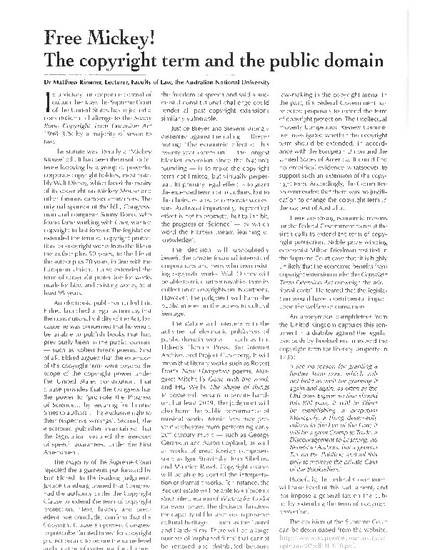
Popular Press
Free Mickey: The Copyright Term and the Public Domain
Incite
(2003)
Abstract
In a victory for corporate control of cultural heritage, the Supreme Court of the United States has rejected a constitutional challenge to the Sonny Bono Copyright Term Extension Act 1998 (US) by a majority of seven to two.
The statute was literally a 'Mickey Mouse' bill. It had been the result of intense lobbying by a group of powerful corporate copyright holders, most notably Walt Disney, which faced the expiry of its copyright on Mickey Mouse and other famous cartoon characters. The original sponsor of the bill, Congressman and composer Sonny Bono, who found fame working with Cher, wanted copyright to last forever. The legislation extended the term of copyright protection for copyright works from the life of the author plus 50 years, to the life of the author plus 70 years, in line with the European Union. It also extended the term of copyright protection for works made for hire, and existing works, to at least 95 years.
An electronic publisher called Eric Eldred launched a legal action against the constitutional validity of the Act, because he was concerned that he would be unable to publish books that had previously been in the public domain - such as Robert Frost's poems. First of all, Eldred argued that the extension of the copyright term went beyond the scope of the copyright power under the United States constitution. That clause provides that the Congress has the power to 'promote the Progress of Science... by securing for limited times to authors... the exclusive right to their respective writings'. Second, the electronic publisher maintained that the legislation violated the freedom of speech guaranteed under the First Amendment.
The majority of the Supreme Court rejected the arguments put forward by Eric Eldred. In the leading judgment, Justice Ginsburg opined that Congress had the authority under the Copyright Clause to extend the term of copyright protection: 'Text, history and precedent, we conclude, confirm that the Copyright Clause empowers Congress to prescribe 'limited times' for copyright protection and to secure the same level and duration of protection for all copyright holders, present, and future'. She maintained that the monopolies granted by copyright law were compatible with the freedom of speech and said a successful constitutional challenge could render all past copyright extensions similarly vulnerable.
Justice Breyer and Stevens strongly dissented against the ruling - Breyer noting: 'The economic effect of this twenty-year extension - the longest blanket extension since the Nation's founding - is to make the copyright term not limited, but virtually perpetual. Its primary legal effect is to grant the extended term not to authors, but to their heirs, estates, or corporate successors. And most importantly, its practical effect is not to promote, but to inhibit, the progress of 'Science' - by which word the Framers meant learning or knowledge'.
Keywords
- Copyright Law,
- Copyright Term Extension,
- Constitutional Law,
- Innovation,
- Competition,
- Cultural Heritage
Disciplines
Publication Date
March, 2003
Citation Information
Matthew Rimmer. "Free Mickey: The Copyright Term and the Public Domain" Incite (2003) Available at: http://works.bepress.com/matthew_rimmer/198/
